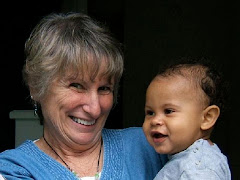I received this call for advice last evening:
Our high energy middle school aged son only eats foods which have a specific consistency and texture. He is resistant to trying new foods which aren't on his very short-list of acceptable ones. While we're familiar with picky eaters amongst children, his patterns seem to go above and beyond being picky about food. We are concerned that he isn't getting adequate nutrition or calorie needs to keep up with his body's needs. On Thanksgiving day, when there were ten different dishes to choose from (including mashed potatoes, which we thought he might like), he ate nothing.
We have tried a number of responses, including letting him choose the foods he'd like to try; involving him in the cooking and preparation of food; working with taste and touch and texture of food through occupational therapy as a young child; holding him while he is eating. When he started school this year he said he wanted to try new foods, but then dissolved into tears when he couldn't eat the food he had chosen to try--a piece of chicken, a pancake or a piece of pizza. We are very concerned that he has an eating disorder which may have long term effects on his physical, emotional and social well-being. Generally, we give him the kinds of foods he wants as often as we can. But there are many instances where this is not feasible, e.g. visiting friends at their houses, and other social contexts. It limits him in different areas of his life, which he has acknowledged.
We think that he might need some additional professional help with this, and we could use some as well. We've run out of creative or responsive ideas which might help him along the way. However, since he feels a great deal of shame about the issue, we suspect it won't be an easy road to get this needed help. He was adopted at age 8 months, and spent that time in an orphanage where "feeding" was accomplished by putting balancing a bottle against a pillow for the babies in the orphanage. There was no physical contact. He refused to touch or play with food from a very early age, and would become enraged when he was given something new or different.
Check out my facebook page: Challenging Children for my reply to this family.
Friday, November 30, 2012
Thursday, November 29, 2012
Loss, Abandonment, Grief, New Families, Newly Reunited Families
Holidays! They conjure up many, many images and along with how those images are conjured up come memories. For some, perhaps for many these are joyful and loving memories and for some, perhaps many these memories are painful and the images are triggers. The memories conscious and unconscious that come along with sights, sounds, smells, touch are the triggers. When you find your children, (bio, foster, adopted) "acting out" their behavior is signaling that they are in distress. And it isn't because they don't want a visit from Santa, or the Chanukah dreidel they are dysregulated and no amount of threatening, cajoling, consequenting will change their behavior in the long run. They might shape up for a couple of minutes, hours or if you are lucky a whole day or two. But, the outrageous, unacceptable behaviors will continue.
Here are some suggestions to make the holidays more peaceful for your family:
Here are some suggestions to make the holidays more peaceful for your family:
1. Window
of Tolerance
Be mindful of your own tolerance level for chaos, mess, unpredictability
and just the overall stress of holiday spending, preparation, drain on your
mental and physical energy. Keep it in
check by not overbooking, not overspending, and most of all keeping your
expectations of yourself always in the forefront of your plans.
Consider your child’s window of tolerance and don’t overplan for him,
don’t keep him up late, don’t use the “you’d better be good or…” routine
because it will only increase the level of stress narrowing the window and
almost guaranteeing a meltdown.
2. Time
In
Instead of putting your child in time out, bring her into you. Let her know it is all too much and you understand. By bringing her next to you, instead of
sending her off by herself to “think about what she has done” at a time when
her brain is unable to thing, you will be helping her to calm. You will be letting her know that you know it
is all too much for her and you are helping to slow it all down.
3. Be
Proactive
Predict when your child might be about to lose it and scoop him up and
suggest getting some air together, even if you are in the middle of a sing
along; even if the turkey has just been brought to the table. If there are three events planned for the
celebration and by the second one, your child is whining and tattling (yes,
even your 14 year old…remember when we stress, we regress) say that you are
calling it a day. Do not use this as a
way of consequenting, but as a loving way of understanding that he just cannot
tolerate another celebration.
4. You
Can’t Always Be There
Keep
in mind that there will be times, that you can’t be where your child is when
her window of tolerance begins to slam shut.
Know that she is doing the best that she can at that moment and so are
you.
Subscribe to:
Posts (Atom)


